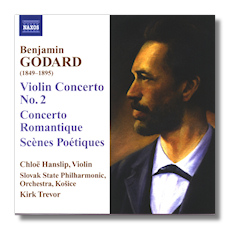
The Internet's Premier Classical Music Source
Related Links
- Godard Reviews
- Latest Reviews
- More Reviews
-
By Composer
-
Collections
DVD & Blu-ray
Books
Concert Reviews
Articles/Interviews
Software
Audio
Search Amazon
Recommended Links
Site News
 CD Review
CD Review
Benjamin Godard

Violin Concertos
- Concerto for Violin #2, Op. 131
- Concerto Romantique for Violin & Orchestra, Op. 35
- Scènes Poétiques, Op. 46
Chloë Hanslip, violin
Slovak State Philharmonic Orchestra, Košice/Kirk Trevor
Naxos 8.570554 DDD 66:03
It used to be that almost everyone knew Godard's "Berceuse," which actually is an aria from his opera Jocelyn. Now even that is fading into the past, at least for people under the age of 50. Too bad, because it's a beautiful tune, and it whets one's appetite for more from Jocelyn, and for more Godard in general. Here comes a new CD from Naxos, then, and it's a delight. The Concerto Romantique was recorded by Aaron Rosand during the LP era, but I've never encountered the two other pieces before, so this CD is a worthwhile addition to Naxos' discography.
The Paris-born Godard (1849-95) trained as a violinist under the great Henri Vieuxtemps. Bruce R. Schueneman's booklet notes, which are not very detailed in general, don't tell us whether the two concertante works recorded here were for Godard's own use or not. In any case, Godard was a busy composer, and despite his untimely death (from tuberculosis) he was able to compose a lot of music, including almost eight operas. ("Almost," because the last was left incomplete upon his death.)
Godard's Jewish roots led to his having little appreciation for the music of Richard Wagner, nor does his music fall in line with that of the French Wagnerites Franck and d'Indy. Instead, Godard's music is more redolent of the salon, with obeisance to Mendelssohn and Schumann. All three of these works, and the Violin Concerto #2 in particular, are full of striking ideas attractively realized and developed. Godard seems not to have had anything profound to say, but he said it so engagingly that most listeners won't mind.
The four-movement Concerto Romantique is romantic in the sense that it revels in the typically generous gestures of a Romantic concerto. Even so, one couldn't call this work predictable, and it's understandable why violinists like Rosand (and now young Chloë Hanslip) revive it from time to time. The late Concerto #2 is even better, though. Here, Godard the composer of grand operas, as well as lighter works for the musical stage, can be heard, and the influence of Mendelssohn seems particularly strong as well. (Never mind that Mendelssohn died two years before Godard was even born!) The four Scènes Poétiques for orchestra are "In the woods," "In the fields," "On the mountain," and "In the village." At 5:47, the first scène is by far the longest. This is postcard music. Still, it condescends neither to its subjects nor to its listeners.
Hanslip is a 20-ish British violinist who already has three other CDs to her credit, a list of prizes, and an even more impressive list of concert appearances and collaborators. She is an assured player, one who has a point of view about this music, and a beautiful sound to sell it with. Without being merely flashy, she attracts – and holds – attention. Despite the fact that it has made over 130 recordings during the CD era alone, the Slovak State Philharmonic Orchestra of Košice (Slovakia's second largest city) doesn't sound like "guns for hire," and there are no traces of anything routine or unkempt in their playing here. Conductor Kirk Trevor, who often appears with Slovak orchestras, does a fine, professional job on this CD.
I understand that Gramophone made this disc an "Editor's Choice," and I understand why. For the most part, it gives us something new, and all of the music is delightful, and delightfully played as well.
Copyright © 2008 by Raymond Tuttle




















